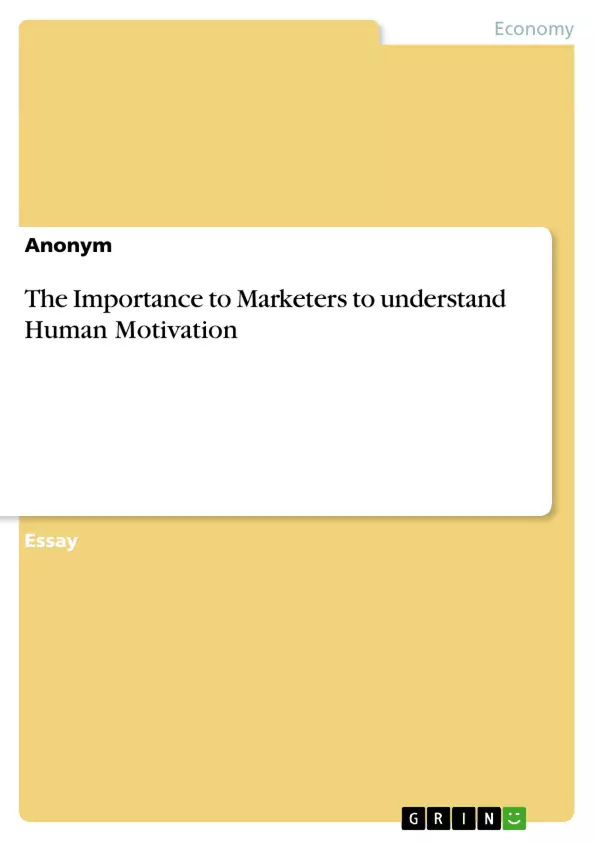‘The importance to marketers of understanding human motivation’
Not only due to the increasing globalisation, economies in developed countries have an
existence of a large scale in differentiated products and services. Furthermore, consumers
can not only distinguish between different options of products to cover their needs but also
between a large variety of companies which offer often similar products.
As every company tries to maximize its sales revenue and hence to extend the market share
to gain a higher return-on-investment it is likely that the company which has got the best
sound understanding of its customers will be the most successful. Simon (1996) underlines
that a company will be the ‘champion’ within its industry if it knows its markets and the
needs of its customers very well.
There is little doubt given that a well developed corporate strategy contributes a part of this
success, too. However, in satisfied markets in which products show little differences in
their values of purpose, it is an imperative for companies to generate extraordinary stimuli
and values in their products offered, to gain a higher attraction from consumers.
But what motivates people to prefer a specific product of a certain company instead the
similar product of the company’s competitor? Is it possible for marketers to influence the
consumer–decision–making process to gain a positive attitude of the specific consumer
towards the company’s products?
To understand what is meant by ‘human motivation’ and why motivations of human-beings
are important to marketers we should first put things in an appropriate order. What actually
means ‘consumer behaviour’? Belch & Belch (1995) define consumer behaviour as ‘the
process and activities people engage in when searching for, selecting, purchasing, using,
evaluating, and disposing of products and services so as to satisfy their needs and desires’.
The figure of the consumer-decisin-process, shown in the appendix, helps to understand
where the unit “motivation” can be found within this process. [...]
Inhaltsverzeichnis (Table of Contents)
- The Importance to Marketers of Understanding Human Motivation
- What is Consumer Behaviour?
- Internal Psychological Process: Motivation
- Mono-thematic Theories
- Poly-thematic Theories
Zielsetzung und Themenschwerpunkte (Objectives and Key Themes)
This essay explores the crucial role of understanding human motivation in successful marketing strategies. It examines the intricate relationship between consumer behaviour and human motivations, highlighting the significance of identifying and targeting specific needs and desires.
- The importance of understanding consumer behaviour in the context of marketing
- The role of motivation in the consumer decision-making process
- Different theories of motivation and their application in marketing
- The impact of mono-thematic and poly-thematic approaches on marketing strategies
- The use of advertising and marketing techniques to appeal to consumer motivations
Zusammenfassung der Kapitel (Chapter Summaries)
- The Importance to Marketers of Understanding Human Motivation: This chapter defines consumer behaviour and explains why marketers need to understand human motivation to influence consumer decision-making. It introduces the concept of internal psychological processes and explores the role of motivation in this context.
- Mono-thematic Theories: This chapter examines theories that assume human behaviour is driven by a single motive, such as Freud's libido theory, Adler's focus on early childhood experiences, and Horney's emphasis on anxiety. It illustrates these theories with practical examples from advertising campaigns.
- Poly-thematic Theories: This chapter delves into theories that suggest human behaviour is driven by multiple motives. It focuses on Abraham Maslow's hierarchy of needs and discusses how marketers use these theories to appeal to different levels of needs in their advertising.
Schlüsselwörter (Keywords)
Consumer behaviour, human motivation, marketing strategies, consumer decision-making process, mono-thematic theories, poly-thematic theories, Freud, Adler, Horney, Maslow's hierarchy of needs, advertising, marketing techniques.
Frequently Asked Questions
Why is human motivation important for marketers?
Understanding motivation allows marketers to identify the underlying needs and desires of consumers, helping them influence the decision-making process and differentiate their products in saturated markets.
What is the definition of consumer behaviour?
Consumer behaviour is defined as the process and activities people engage in when searching for, selecting, purchasing, using, evaluating, and disposing of products and services to satisfy their needs.
What are mono-thematic theories of motivation?
Mono-thematic theories assume human behaviour is driven by a single motive, such as Freud's libido theory, Adler's focus on childhood experiences, or Horney's emphasis on anxiety.
How does Maslow's hierarchy of needs apply to marketing?
Marketers use Maslow's poly-thematic theory to appeal to different levels of human needs, from basic physiological requirements to higher-level self-actualization, in their advertising strategies.
What is the difference between internal and external stimuli in marketing?
Internal stimuli relate to psychological processes like motivation, while external stimuli are the extraordinary values or marketing techniques companies generate to attract consumers to their specific products.
- Quote paper
- Anonym (Author), 2003, The Importance to Marketers to understand Human Motivation, Munich, GRIN Verlag, https://www.grin.com/document/17220



